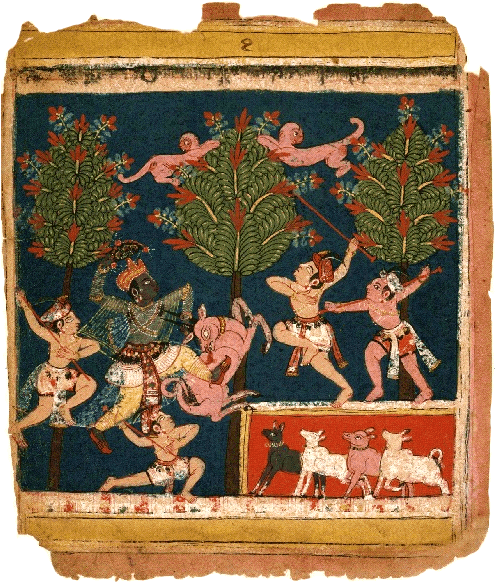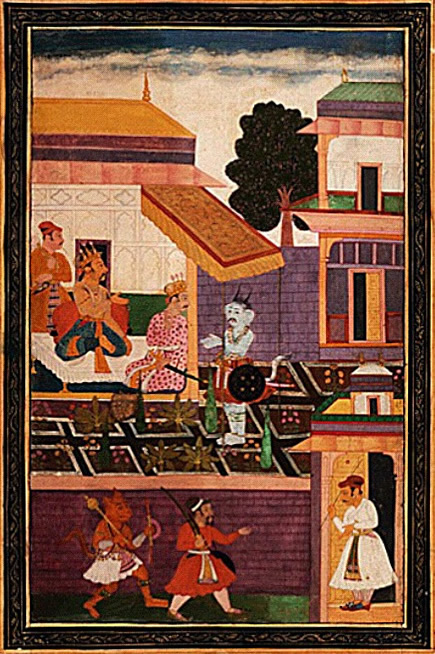Chapter 36: The Bull Arishthâsura defeated and Akrûra Sent by Kamsa

(8) Acyuta, the Lord, thus speaking slapped His arms to anger Arishtha with the sound of His palms and assumed a posture thereto in which He threw His serpentine arm over a friend's shoulder. (9) And indeed managed He that way to enrage Arishtha who furiously scratched the earth with his hoof and [then] with his tail raised to the clouds attacked Krishna. (10) Pointing his horns straight ahead staring bloodthirsty from the corners of his eyes at Krishna, ran he full speed like a thunderbolt released by Indra. (11) The Supreme Lord though like a rival elephant seized him by the horns and threw him eighteen feet to the back. (12) Warded off he quickly restored to charge again sweating all over while he mindless in his anger breathed heavily. (13) In his attack was he seized by the horns and made to trip by His foot so that he slapped down to the ground like a wet garment. Next was he struck by the Lord with his own horn [broken off] till he fell flat. (14) Vomiting blood, excreting a mass of urine and stool and throwing his legs about went he then in pain rolling with his eyes to the abode of Death. The gods then scattered flowers upon Krishna in worship. (15) After thus having killed the one with the big hump entered He, that feast to the eyes of the gopîs, while being praised by the twice-born, the cowherd village together with Balarâma.
(16) With the demon Arishtha being killed by the Worker of Miracles, Krishna, spoke then to Kamsa the powerful sage Nârada who had the vision of God: [see 1.6: 25-29] (17) 'The girl of Devakî is Yas'odâ's daughter and Krishna and also Balarâma, the son of Rohinî, are from Vasudeva, who fearfully placed them in charge of his friend Nanda; they were the two who actually have killed your men.'
(18) Hearing that did the lord of Bhoja, in his senses disturbed of anger, take up a sharp sword to kill Vasudeva. (19) Nârada withheld Kamsa [thus in saying ] that Vasudeva's two sons would bring about his death and with that in mind put he him and his wife in iron shackles [see also 10.1: 64-69]. (20) After the deva-rishi had left addressed Kamsa the demon Kes'î in order to send him after Them: 'You're the one to kill the two of Râma and Kes'ava'.
 (21) Then he summoned for Mushthika, Cânûra, S'ala,
Tos'ala and such, his ministers and his elephant keepers, to whom the
king of Bhoja said: (22-23) 'Dear
mates, Mushthika
and Cânûra, please
listen to this o heroes. It turns out that the cowherd village of Nanda
is where the two sons of Ânakadundubhi are living. My death was
predicted to happen by [the hands of] Krishna and Balarâma. If we
get Them to come over here for a game of wrestling you have to You kill
them. (24) Build a ring and various stages surrounding
it - all subjects in and outside the city should witness how They
voluntarily participated in the competition. (25)
O elephant-keeper, by you my good man, should the elephant Kuvalayâpîda be
taken to the entrance of the arena where my enemies are to be
destroyed. (26) Commence according the injunctions the
bow-sacrifice on the fourteenth [Caturdas'î] of the month and
offer in sacrifice the right kind of animals to the Lord of the Spirits
[S'iva], the graceful one.'
(21) Then he summoned for Mushthika, Cânûra, S'ala,
Tos'ala and such, his ministers and his elephant keepers, to whom the
king of Bhoja said: (22-23) 'Dear
mates, Mushthika
and Cânûra, please
listen to this o heroes. It turns out that the cowherd village of Nanda
is where the two sons of Ânakadundubhi are living. My death was
predicted to happen by [the hands of] Krishna and Balarâma. If we
get Them to come over here for a game of wrestling you have to You kill
them. (24) Build a ring and various stages surrounding
it - all subjects in and outside the city should witness how They
voluntarily participated in the competition. (25)
O elephant-keeper, by you my good man, should the elephant Kuvalayâpîda be
taken to the entrance of the arena where my enemies are to be
destroyed. (26) Commence according the injunctions the
bow-sacrifice on the fourteenth [Caturdas'î] of the month and
offer in sacrifice the right kind of animals to the Lord of the Spirits
[S'iva], the graceful one.'(27) Thus having issued his orders called he, cunning as he was in the art of securing his personal interest, for Akrûra ['the one not cruel'], the most eminent Yadu. He took his hand into his own and said: (28) 'Dear master of charity please do me a favor. With all respect, there is no one among the Bhojas and Vrishnis to be found who is as merciful as you. (29) Therefore I depend on you, o kindness, who always carries out his duties soberly, just like Indra, the mighty king of heaven, who achieved his goals by taking shelter of Lord Vishnu. (30) Go to Nanda's cowherd village where the two sons of Ânakadundubhi live and bring Them without delay here on this chariot. (31) The two of Them have, by the gods under the protection of Vishnu, been sent to bring about my death; bring Them together with the gopas headed by Nanda over here, and tell them to take gifts of tribute with them. (32) Brought here I'll have Them killed by the elephant that is as mighty as the time itself, and if They escape from that, will my wrestlers as strong as lightning put an end to Them. (33) And with the two of Them dead will I next kill the pained relatives of whom Vasudeva is the leader: the Vrishnis, Bhojas, and the Das'ârhas [see again 10.1: 67]. (34) With my old father Ugrasena I will deal the same way, he who is so greedy for the kingdom and his brother Devaka and my other enemies. (35) And thus, o friend, will those thorns in this world be destroyed. (36) With my elder relative [father-in-law] Jarâsandha and my dear friend Dvivida and S'ambara, Naraka and Bâna, who indeed are of a strong friendship for me, will I, killing all those conspiring sura kings, enjoy this earth. (37) And now, with this knowledge, bring me quickly the young boys Râma and Krishna to attend here to the bow-sacrifice and to respect the glory of the Yadu capital [of Mathurâ].'
(38) S'rî Akrûra said: 'O King, your way of thinking to clear out the disagreeable is conclusive; one should act with an equal attitude in respect of the perfect and the imperfect, it is destiny after all that produces the results. (39) The common man, even though struck by providence, fervently acts to his desires and is confronted with happiness and distress, nonetheless will I do as you ordered.'
(40) S'rî S'uka said: 'Thus instructing Akrûra and also sending off his ministers entered Kamsa his quarters and returned Akrûra to his own residence.'

